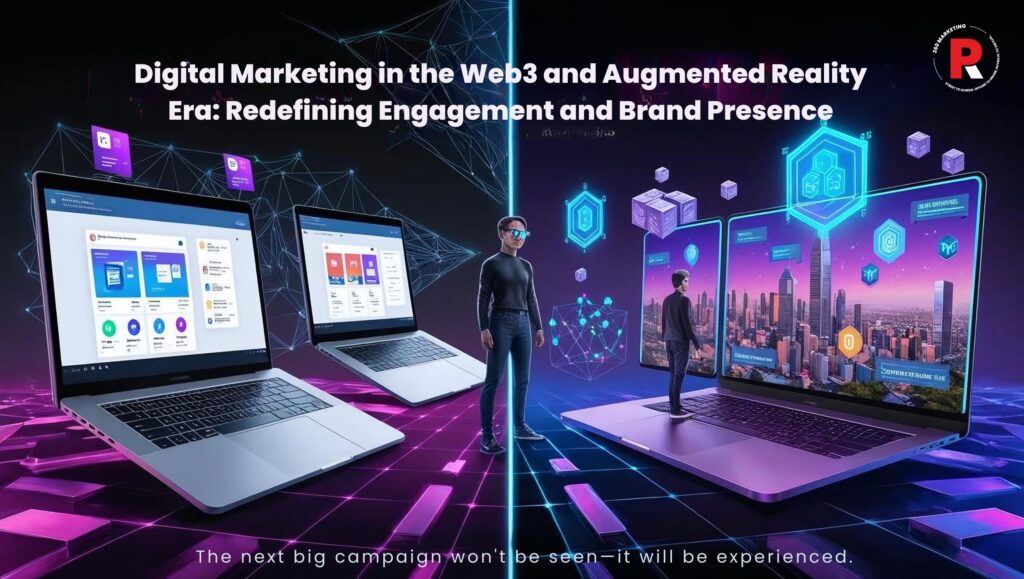Digital Marketing in the Web3 and Augmented Reality Era: Redefining Engagement and Brand Presence
In an age where technology evolves faster than ever, digital marketing continues to reinvent itself. From email newsletters and static banner ads in the early 2000s to influencer partnerships and personalized content streams in the 2020s—marketing has moved from monologue to dialogue. But we’re now on the brink of an even more radical shift: the rise of Web3 and the immersive potential of augmented reality (AR).
Together, these innovations are not just changing the tools marketers use—they’re reshaping the very nature of how brands connect with people.
What Is Digital Marketing Today?
At its core, digital marketing is about using digital channels—like search engines, websites, social media, email, and mobile apps—to connect with consumers. The Web1 and Web2 phases emphasized information dissemination and engagement, respectively. We moved from static websites to interactive platforms, from generic ads to hyper-targeted campaigns.
But the foundation has always remained: capture attention, convey value, and drive action.
The Shift Toward Web3
Web3 marks the next evolution of the internet—one that’s decentralized, transparent, and driven by user ownership. Powered by blockchain technology, Web3 empowers users to control their data, participate in governance, and benefit directly from the platforms they engage with.
For digital marketers, this means:
Greater transparency and trust
in transactions and advertising
Community-driven growth, where users become co-creators and co-promoters
Tokenized rewards
to incentivize loyalty and engagement
Instead of marketing to users, brands now collaborate with them in a value-exchange ecosystem.
Augmented Reality: The Gateway to Immersive Experiences
AR adds a new layer of depth to digital marketing—literally. It overlays digital content onto the real world, creating interactive experiences that are both informative and entertaining.
Imagine:
- Trying on clothes or makeup virtually before purchasing
- Scanning a product in-store to view stories, recipes, or 3D instructions
- Attending a virtual launch event from your living room via AR
Brands like IKEA, L’Oréal, and Snap are already leveraging AR to deliver immersive brand moments that break through the noise of traditional ads.
Merging Web3 and AR: The New Marketing Frontier
When Web3 meets AR, digital marketing becomes multidimensional and deeply personalized. Here’s how forward-thinking brands are making it work:
NFTs as digital assets: Exclusive brand collectibles, VIP passes, or loyalty badges that customers actually own and trade
Virtual showrooms and experiences: Think of walking into a 3D store using your phone or headset and exploring products with a tap
Community-powered campaigns: Using DAO (Decentralized Autonomous Organization) models where fans vote on the next product or campaign
Incentive-based engagement: Tokens and smart contracts that reward users for sharing, reviewing, or co-creating content
Challenges in This New Landscape
Innovation always comes with growing pains:
- Privacy concerns around data usage, even in decentralized models
- Technology adoption gaps—especially in rural or less digitally-savvy markets
- Skillset gaps for traditional marketers who now need to understand blockchain, UX in 3D environments, and digital asset management
The solution? Continuous learning and a willingness to experiment.
The Road Ahead: Marketing in the Metaverse and Beyond
As we blend physical and digital experiences, the lines between real and virtual will blur. The future will likely involve:
- AI-powered personalization in AR spaces
- Smart contracts for loyalty programs
- Seamless commerce in metaverse-like environments
- Data being owned by users, and marketers earning trust to access it
To stay ahead, marketers must evolve from mere communicators to experience architects.
Digital marketing has come a long way—from the streets to the screens, and now into immersive, interactive realms. In the Web3 and AR era, it’s no longer just about telling a brand story—it’s about inviting people to live it.
For marketers ready to embrace decentralization, interactivity, and innovation, the future holds unlimited possibilities.





4 Responses
It was valuable information, thanks for sharing.
This piece of writing will help the internet visitors for building
up new website or even a weblog from start to end.
Stop by my web page … invisible charecter
These are truly enormous ideas in concerning blogging. You have touched
some pleasant points here. Any way keep up wrinting.